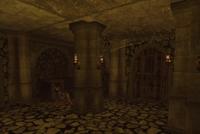| |
Site Navigation
Main
News
Forums
Games
Games Database
Top 100
Release List
Support Files
Features
Reviews
Previews
Interviews
Editorials
Diaries
Misc
Download
Gallery
Music
Screenshots
Videos
Miscellaneous
Staff Members
Privacy Statement
|
|
Ekim's Gamer View: The game of Numbers
Last week I talked about names and first impressions. This week I will also talk about first impressions, but from a numbers' perspective. No, not stat numbers, but rather review ratings. As the web developed over the years, many sites popped up, like our very own and beloved RPGdot, and with them a surge of game reviewers, professional or not. Most reviews come with a rating, a basic scale by which the game is judged, sometimes maybe too quickly.
Rating of Games, or Game of Ratings?
What's in a rating? What does this number mean exactly? Is it a proper representation of the reviewer's impressions of the game? If a reviewer did a good job, the number should only tell a fraction of the story. It should be a quick representation of the quality of the product he has been presented with, not a detailed judgment of every and all features contained in that game. This you should find within the reviewer's actual review, the text hidden behind the rating.
So why do people seem to put so much importance on the rating? Of course there's the obvious marketing ploy consisting of putting a big score on the game's box and quoting one or two key sentences from the review. Even if the reviewer said that the game should not be played by a big portion of the gaming community, the publisher will still stick that big 90% score on the cover. Those high ratings sell games, and consumers buy into this marketing scheme. No wonder then why the rating is sometimes the only thing readers will ever look for in a review. They have been cleverly conditioned to think that it universally tells the game's worth. But in fact certain games have a very different worth to different types of people.
I'll take the highest rated game, please
The real question is: does the rating really tell the reader whether or not the game will be good for him? Probably not. The reasons why one person will love a game will sometimes be the same reasons someone else hates it. In this regard, stopping at the score might be deceiving, but reading the review might shed some light on the reasons why a certain reviewer liked or disliked the game. In turn, a positive review might confirm to the reader that a certain game should still be avoided. By reading the review, you might learn about a certain feature that you dislike, even though the reviewer himself thought that it was good.
It's always been my opinion that a good, well written review should give you enough information to make a decision of your own, regardless of the final score and how positive or negative the reviewer was. Everyone have different opinions, but a review should be filled with facts that should give you enough information to decide whether the game would appeal to you or not. If the reviewer liked the game but you clearly sense that you would not like it at all after reading his review, you should be grateful to him because he has done his job. A review does not exist to convince, it exists to inform.
But some reviews might sometimes seem slightly skewed. As was pointed out to me a number of times, since a lot of game reviewers on the web are not professionals (i.e. they are not paid to do it, and do it on their own free time), they tend to stick to games that interest them the most. Because of this, there is a greater chance that the reviewer will play games that he likes, or that he has a high possibility of liking. So average scores end up being inflated because only a few reviews will be made by those who weren't interested in the game to begin with, or a few truly impartial reviewers that really give the lowdown on a certain game.
The Rating: Reviewer's Bane
Still, even though games get more and more reviewed by people who like the products they evaluate, does that make reviews hopelessly useless? I don't think so. I personally think that it does tend to devaluate the meaning of the numerical score though, but it makes the text become even more important in a review. In a day and age when Joe the postman sits down at home after his day at work and writes a review of "Mafia", scores should take a serious backseat to what this guy has to say. We might disagree with him, but he is a gamer the same as we are, and so his opinion has the same value as everyone else's.
Of course there are some bad reviews out there, the kind that make you wonder if the reviewer truly played the game at all. Those will continue to exist until the end of time. Still, whether a certain review is good or bad should be decided after reading the actual review, not just by looking at the score. In the end though, it seems that reviewers are doomed to live and die by the scores they give, and those will ultimately be the only thing that will ever be remembered of the games they reviewed. What a shame.
|
|




